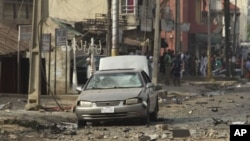In northern Nigeria, health workers continue to treat dozens of wounded after an Easter Sunday bombing killed at least 36 people. The bombing took place despite increased security throughout the region. No one immediately claimed responsibility, though the militant Islamist group Boko Haram is suspected to be behind the violence.
Residents of Kaduna say life is returning to normal Monday, a day after the car bombing that rocked a busy commercial area in the regional capital.
The leader of a local Christian interfaith association, David Obadiah, said people remain vigilant but life cannot stop.
"Kaduna is peaceful. Security measures have been big and people are going about doing their normal businesses. People have to do their normal business, people have to sell in the market, people have to do all those things. You can't just be waiting indoors suspecting that somebody is coming to bomb," Obadiah said.
Northern Nigeria is plagued by almost daily shootings and bomb attacks that are increasingly targeting civilians.
On Sunday morning, police say a Honda Accord, laden with explosives, blew up on a main city street in Kaduna. Some suspect the intended target was a nearby Christian church.
Authorities said it appeared that the car had tried to approach the church compound but was turned back by security guards. Minutes later, the car exploded near a motorcycle taxi station.
The extremist group Boko Haram is known to target Christians during holidays.
Churches throughout the north have employed volunteer security guards since bombings killed 44 people on Christmas Day last year, including more than 30 at a Catholic church near the capital, Abuja.
Nigerian security forces had stepped up security in the north for Easter weekend, after saying they had uncovered multiple plots to disrupt festivities.
However, Sunday's attack in Kaduna, as well as smaller incidents throughout the region, show just how stubborn and pervasive the threat really is.
Security analyst and retired army major Yahyu Shunku said the government needs to do more.
"The primary aim of government is to assure the security and lives and properties of its citizens," noted Shunku. "The government has failed to secure its citizens from these types of attacks. So it is now left for the people of the country to see a way out for themselves. The government has been saying they will take action, they will do this, they will do that. And up to the present, nothing has been done."
According to Human Rights Watch, Boko Haram has killed more than 1,000 people since its resurgence in 2010.
The Nigerian government has struggled to put a stop to attacks. Attempts at indirect peace talks with Boko Haram fell apart in March.
Boko Haram wants to impose Islamic law in northern Nigeria and is demanding the release of arrested members.
Experts say the core Boko Haram cell has fractured into groups of varying extremism, some of which have professed ties to al-Qaida's Africa franchises.
News
Nigerian Easter Bombing Death Toll Rises
- By Anne Look




